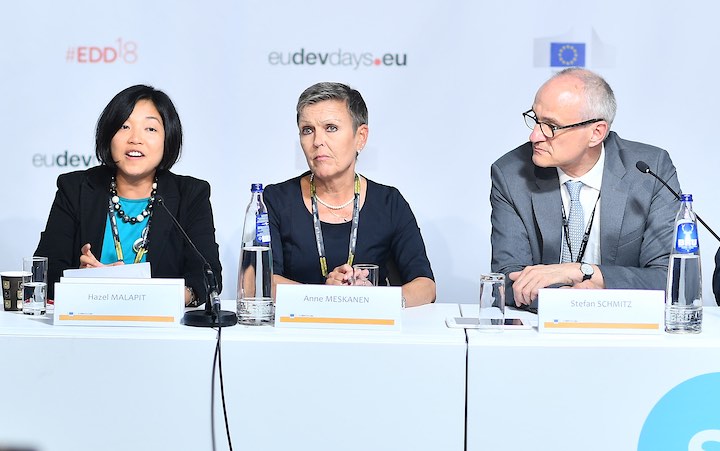If we want to eradicate poverty, we need gender equality.
This was the key message from a joint panel event at European Development Days in Brussels June 6. Changing Women’s Lives in the Rural World brought together a panel of global experts to discuss how to move beyond conventional views of gender mainstreaming in development. It was hosted by the European Commission’s Directorate General for International Cooperation and Development (DEVCO), as well as the governments of Finland, Germany, and the Netherlands.
“Tracking the institutions, social norms, and behaviors at the root of gender inequality is crucial for gender transformation,” said DEVCO Deputy Director-General Marjeta Jager. This is the idea behind gender transformative approaches, or GTAs, which aim to look beyond the symptoms of gender inequality—such as women’s limited access to land rights or credit—and address the underlying systemic norms, behaviors, and beliefs driving those symptoms.
Proponents of GTA argue that by engaging men, women, and children in examining and challenging existing gender norms and power dynamics, this approach can bring about deeper long-term social change. “A key aspect of GTA is providing women with opportunities to empower themselves,” said Hazel Malapit, senior research coordinator in IFPRI’s Poverty, Health, and Nutrition Division.
Examples of transformative approaches include developing social protection policies that include childcare and family planning, revising tax and employment laws to boost women’s participation in small- and medium-sized enterprises (SMEs), and involving men in nutrition interventions such as trainings on improved infant and child feeding practices. In addition, efforts should be made to highlight the importance of women’s household tasks, such as cooking, in overall value chain functioning, as well as to incorporate gender as a core focus of governments’ and organizations’ action plans.
“To understand which approaches can truly change women’s lives,” Malapit argued, “we need to make sure our indicators align with our goals and strategies.” For projects that aim to empower women, she said, tracking progress in a credible way requires an indicator like the Women’s Empowerment in Agriculture Index (WEAI), which measures women’s empowerment in the agricultural sector and within households. The tool looks specifically at women’s ability to make important decisions regarding production, resources, and income; to participate in groups; and to have sufficient time to take care of themselves and their families. Malapit emphasized the importance of evidence-based tools such as the WEAI in gender transformative interventions, stressing the need to understand what is really happening in rural women’s lives in order to track progress and drive real change.
Panelists also highlighted the need to involve both men and women in redressing gender inequality. Focusing on how to empower women to lead development projects, SNV Cameroon Program Coordinator Marguerite Belobo Mbia said that feedback and buy-in from both the women and the men involved in the project is critical. “Transformation cannot be made only with women—you need men,” she said. Specifically, project planning and training should aim to show how empowering women as leaders will benefit the project and community as a whole.
Philip Erick Otieno Owitti, executive director of Men for Gender Equality Now (MEGEN) in Kenya, agreed. If men are to be engaged in women’s empowerment, development practitioners must “speak their emotional language” to show them the benefits for themselves and their societies, he said. He also emphasized the need to begin engaging men from a young age and called for stronger focus on gender equality in schools.
Women also need training and organizational tools in order to work effectively and confidently for their own empowerment, panelists said. By participating in community-level rural organizations, women can pool access to resources, knowledge, and strong social networks, thus better positioning themselves for leadership roles in their households and communities.
Gender inequality remains a rampant and complex societal challenge, particularly in rural communities. By more fully integrating gender transformative approaches into policies and programs, stakeholders can help ensure women’s active and effective participation in driving development and reducing hunger and poverty.
Sara Gustafson is a Communications Specialist with IFPRI’s Markets, Trade and Institutions Division; Hazel Malapit is a Senior Research Coordinator with IFPRI’s Poverty, Health, and Nutrition Division.







